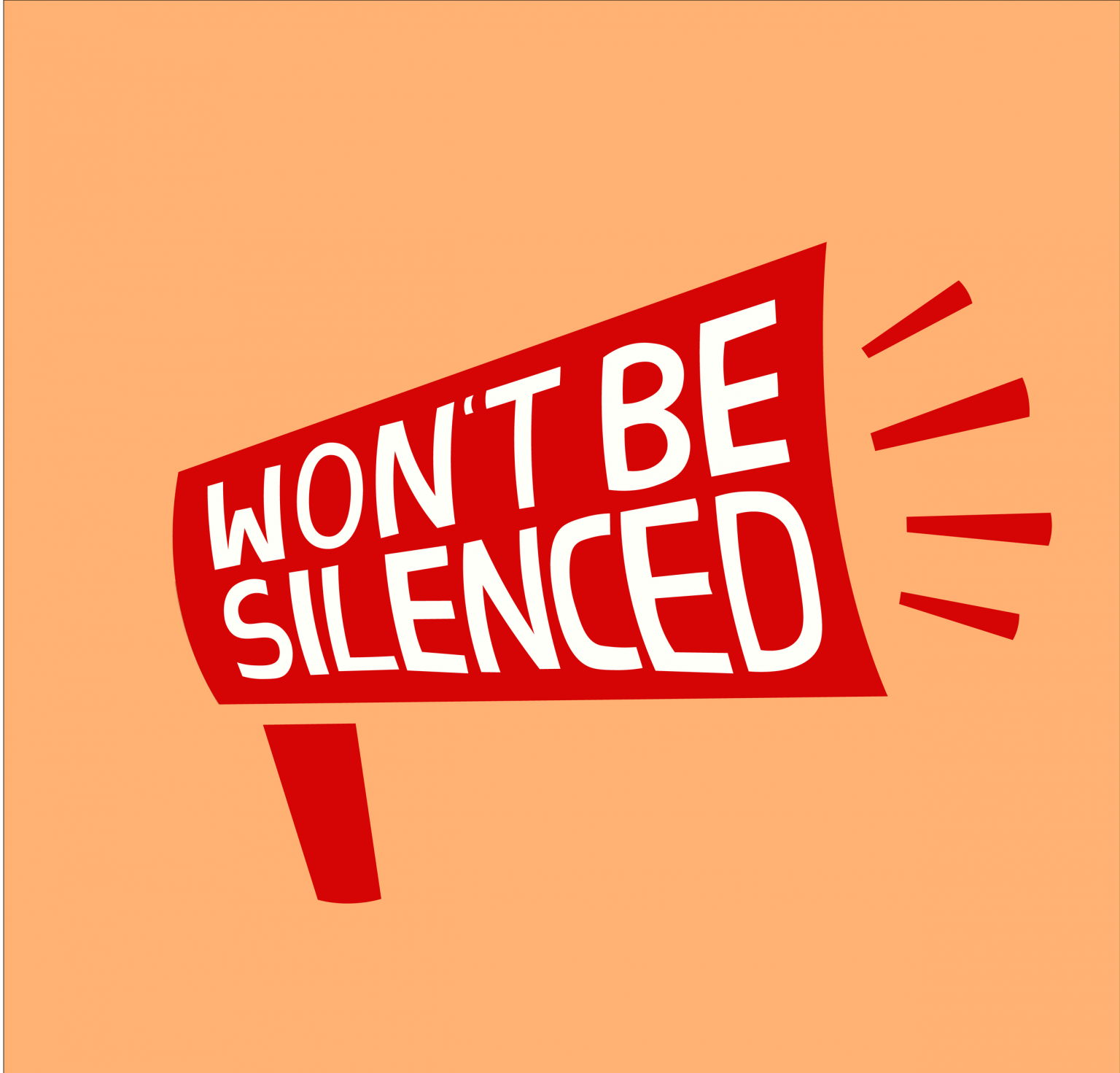Written by Susmita Aryal
In the year 2021, when hundreds of women were out on streets for a Women’s march as a protest to fight violence against women. Anshu Khanal, one of the performing artists laid down on a stretcher and was carried all the way from Basantapur to Singha Durbar demanding justice for a 17-year-old girl whose body was found dead in a forest of Baitadi district. Evidently, the post mortem report suggested that the teenager was raped before strangling her to death.
In the protest, Anshu who is now a journalist at Nepal Live media, draped herself in yellow cloth. After the protest, many people started approaching her, mostly online. She shares how after the incident, it converted into a bitter experience where she was brutally bullied online. She shares about how the online harassment targeted not just her protest and resistance, but her identity and body. Anshu shares, There was a time when I used to wear a nose pin. Many people were always interested in commenting about my looks rather than what work I was doing”. This experience of Anshu is not a standalone. Women throughout the globe experience exponential amount of online violence, and such online comments and harassment is mostly targeted to women’s bodies and identities and threats of sexual violence.
Ever since Anshu’s experiences of online violence, she makes sure to think twice before posting stories online especially, if it’s a women related subject. She said, “I have been accused of taking money in the past for speaking up. It really disheartened me when people time and again messaged me as, “beshyabriti garna parne manche kina andolan ma (What is a woman like you who should be doing prostitution being involved in movement)? Online violence towards women is a tactful way in which women are silenced for speaking out against patriarchy and resisting sexism in their lives. Online threats and harassment are ways which cause women to self-censor themselves, either by showing and expressing themselves less, or by mocking their stance. The goal of online violence towards women is to stop them from claiming spaces of online platforms for speaking out about their experiences and resisting sexism.
For days and years, Anshu was scared to open up about the matter. She had no courage to speak and so her expressions were curtailed psychologically as it meant closure to her identity issues. She had to deactivate her facebook and instagram accounts for around two months because of multiple rape threats online. As she was not able to share this with her closed ones openly, she kept it to herself which affected her mind so much.
Even then, the disclosure of such a conversation with me was a much more emotional break away from the reasoning of her self-taught right and wrongs. Her expression is self-evident as to how she garnered confidence in moving time, but there are so many young girls and women out who do not even come across this discussion edge.

In Nepal, patriarchy has always been an issue. Patriarchal domination treats women as subordinate to men. This is the reason why violence comes out differently for men and women. The oppression of patriarchy often diminishes women’s worth to no more than an object and they are not allowed to put opinions. This can be seen through normalization of news around violence against women, rape cultures around us, victim shaming and blaming and social systems built to protect perpetuators. In many cases, harassment against women isn’t considered a “big deal” and something that a woman has to go through. The situation is grimmer in the online sphere, where online violence against women isn’t even considered violence in the first place.
There are multitudes of cases around online violence against women that shows how important it is to deal with this with sensitivity and urgency. Cases of women’s intimate photos being shared without their consent in chatrooms is frequently brought forth. These intimate photos could be a way for sexual expression for women. But when shared without their consent, this becomes a way to violate their bodily autonomy and integrity. This patriarchal society wrongfully places a woman’s morality and character on her sexuality. And this becomes a weapon against women. A person can easily sexually assault a woman without physically touching her. Blackmail ruins her identity without revealing their own identity.
Only 37% women feel safe online and just 26% feel their information is private, according to the reports suggested by ‘Demographic of cybercrimes’. The increasing truth of violence against women is that privacy has not always been on the side of women. Sexual integrity of a woman to her husband is sacrosanct and once she gets married, she is considered a property of her husband forever, more conveniently entitled to sexual assault, torture, rape against her will. Because most women find it hard to share with family, being fearful, their dignity associated with sexuality is used as a weapon against them.
Anshu Khanal added how online space has changed the scope of violence against women more than what it is, in person. She says, “we spoke through art but it’s interesting to see that things we fought out on streets were just few of what we saw. Because of violence the large sections were already online just as we reached home”. The data by Nepal police stated that a total of 3906 cases were registered in the fiscal year 2020/2021. The data were related to photo mutilations, hacking, bullying, stalking, defamation, all of them including online violence. While the data makes it self-evident to equip us with the knowledge of online crime threats throughout the country, it is important as to why women should be aware about this.
In Nepal, crimes via online are prosecuted under the section 47 of the Electronic Transaction Act (ETA) 2007. Needless to say, the cyber laws handling of Nepal is not adequate enough. While the problem itself makes it difficult for them, the other is the stiff system where cases are handled only by Kathmandu District Court, posing it as another challenge for those living outside the Kathmandu valley. Officials also say that even police have not been able to resolve cyber crimes cases due to lack of cyber security experts and even if they do, there is a loophole in the understanding of the sensitivity of the victim which does not get proper care. “The ETA laws state that such cases should be filed prior within the thirty-five days of the occurrences which in fact is itself a very limiting period to case report”, said Mamta Siwakoti, a digital rights advocate based in Kathmandu.
Advocate Siwakoti further finds, “laws under Electronic Transaction Act are ambiguous in its language which consist of abstract phrases like “public morality, decent behavior” which do not incorporate an individual rights to freedom of expression (Article 17 (2a)) and consent provided that the material may be controversial for the rest of the population”. This idea of criminalization on the basis of public morality and decent behavior is on one hand censoring women and gender diverse people’s own sexual expression online. Law fails to recognize the crucial element in differentiating choice with violence – consent.
Adding to that moreover, there have been security breaches on government websites, about 1500 government owned websites were shut down. Publics whose data have been leaked through mobile apps like esewa and others often have a hard time going through their privacy issues alone. As Siwakoti suggests, “ indicated that many laws related to cyber rights are blurry in Nepal now, there should be governmental legality provisions that help people secure people’s data online because many still do not know who to hold accountable”.
Online harassment has also a lot to do with one’s psychology of behavior and mental health, “who feels online harassment has been a new way of attacking people’s minds digitally”.
Recently, two young girls (names unrevealed) who were harassed online attempted suicide. People often approach suicide because they find no alternative as they rarely get support from their family, ‘said Pramila Wosti, a counseling psychologist at Patan Manashik Hospital, concluding’ “family conversations are necessary”.
Because online violence does not have a uniform definition and differs between jurisdictions, it impacts adversely in the psyche of women. Often, woman survivors of domestic violence, rape or marital rape have a very hard time to move on in life. Exposure to such violence leads to mental health problems. A lot of survivors of violence have increased risk of depression, alcohol and drugs use and other self-harm behaviors including attempting suicide. But in cases of online violence, and conversations about it, victims’ psychological health becomes the least priority. Online mode snaps away from an in-person talk making the reality space claustrophobic within themselves. The violence that happens online is implicit, which creates a hard time for victims to even validate their own feelings, let alone talk about it with their social circle and gain support. Additionally, the justice system that isn’t supportive, with little to no resources on addressing the violence, can be more detrimental to the mental health of the survivors.
Violence against women has been deeply rooted in our society. Incidents after incidents have been reported one after another. While change in time has certainly brought a change in mindset of people, it will still take a long time. In the end, it is not about what mode of violence is. It is also not just about the inadequate laws, it is about patriarchy and gender discrimination that leads to violence against women and society that creates space for the violence to perpetuate. Women should be able to have a safe space to express their opinions, their sexuality and themselves. Speaking of violence of different forms like online, is important. It matters to create discourse around it, and more so, it is important to have collective resistance against it. We are scabbed by the violence that goes against women and as Anshu did, by sharing about it, we can too, little by little, definitely dismantle the patriarchy and its violence.
 Susmita Aryal is a final year undergraduate student of English Literature & Media Studies at St. Xavier’s College, Maitighar. She is an independent writer based in Kathmandu. Her works previously have been published in The Rising Nepal, The Himalayan Times, Nepal news & Feminism in India. She is a member of thepomelo.net which focuses on himalayan voices. Interested in poetry, she is working on finalizing the poetry collection book & is looking forward to publishing. She has a love for manual fashion and jewelry designing, & has been experimenting in digital illustrations currently. When not writing and designing, she loves to travel & talk to new people.
Susmita Aryal is a final year undergraduate student of English Literature & Media Studies at St. Xavier’s College, Maitighar. She is an independent writer based in Kathmandu. Her works previously have been published in The Rising Nepal, The Himalayan Times, Nepal news & Feminism in India. She is a member of thepomelo.net which focuses on himalayan voices. Interested in poetry, she is working on finalizing the poetry collection book & is looking forward to publishing. She has a love for manual fashion and jewelry designing, & has been experimenting in digital illustrations currently. When not writing and designing, she loves to travel & talk to new people.
